Chemokine-targeted nanoparticles: stimulation of the immune system in cancer immunotherapy
Surgery, chemotherapy, radiation therapy, and immunotherapy are potential therapeutic choices for many malignant and metastatic cancers. Despite adverse side effects and pain, surgery and chemothera
[...] Read more.
Surgery, chemotherapy, radiation therapy, and immunotherapy are potential therapeutic choices for many malignant and metastatic cancers. Despite adverse side effects and pain, surgery and chemotherapy continue to be the most common cancer treatments. However, patients treated with immunotherapy had better cancer control than those who got other treatments. There are two methods to activate immunological pathways: systemically and locally. To modify the tumor microenvironment (TME), the former uses systemic cytokine/chemokine (CK) delivery, whilst the latter uses immunological checkpoints or small molecule inhibitors. Organic and inorganic nanomaterials (NMs) enhanced the efficacy of cancer immunotherapy. NMs can transmit drugs, peptides, antigens, antibodies, whole cell membranes, etc. Surface-modified NMs precisely target and enter the tissues. The inner core of surface-modified NMs is composed of chemicals with limited bioavailability and biocompatibility, resulting in prolonged blood retention and decreased renal clearance. These platforms hinder or prevent many immune cell activities and modify the TME, enhancing the efficiency of cancer immunotherapy. By inhibiting CK/CK receptor signaling, cell migration and other immune responses could be controlled. Developing CK-targeted nanoparticles (NPs) that inhibit CK signaling or take advantage of the ligand-receptor connection is possible. Surface chemical modification of NMs with CKs or specific peptides has several medicinal applications, including tissue-specific drug delivery and limited cell migration in cancer-afflicted conditions. This review covers current developments in the role of different groups of CK-loaded NP in tumor therapy targeting immune cells and cancer. It also covers the role of NP targeting CK signaling which aids in immunogenic cell death (ICD) and induction of antitumor immunity. In addition, CK gene silencing and its capacity to prevent cancer metastasis as well as inhibition of immune cell migration to modulate the TME are discussed.
Ranjeet Singh ... Partha Pratim Manna
Surgery, chemotherapy, radiation therapy, and immunotherapy are potential therapeutic choices for many malignant and metastatic cancers. Despite adverse side effects and pain, surgery and chemotherapy continue to be the most common cancer treatments. However, patients treated with immunotherapy had better cancer control than those who got other treatments. There are two methods to activate immunological pathways: systemically and locally. To modify the tumor microenvironment (TME), the former uses systemic cytokine/chemokine (CK) delivery, whilst the latter uses immunological checkpoints or small molecule inhibitors. Organic and inorganic nanomaterials (NMs) enhanced the efficacy of cancer immunotherapy. NMs can transmit drugs, peptides, antigens, antibodies, whole cell membranes, etc. Surface-modified NMs precisely target and enter the tissues. The inner core of surface-modified NMs is composed of chemicals with limited bioavailability and biocompatibility, resulting in prolonged blood retention and decreased renal clearance. These platforms hinder or prevent many immune cell activities and modify the TME, enhancing the efficiency of cancer immunotherapy. By inhibiting CK/CK receptor signaling, cell migration and other immune responses could be controlled. Developing CK-targeted nanoparticles (NPs) that inhibit CK signaling or take advantage of the ligand-receptor connection is possible. Surface chemical modification of NMs with CKs or specific peptides has several medicinal applications, including tissue-specific drug delivery and limited cell migration in cancer-afflicted conditions. This review covers current developments in the role of different groups of CK-loaded NP in tumor therapy targeting immune cells and cancer. It also covers the role of NP targeting CK signaling which aids in immunogenic cell death (ICD) and induction of antitumor immunity. In addition, CK gene silencing and its capacity to prevent cancer metastasis as well as inhibition of immune cell migration to modulate the TME are discussed.
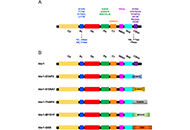 Role of Vav1, a hematopoietic signal transduction molecule, as an adaptor protein in health and diseaseOpen AccessReviewThe growth and differentiation of normal cells are controlled by protein-tyrosine kinases, which serve as receptors for a wide variety of external signals. Small protein modules called Src homology [...] Read more.Shulamit KatzavPublished: April 28, 2023 Explor Immunol. 2023;3:158–173
Role of Vav1, a hematopoietic signal transduction molecule, as an adaptor protein in health and diseaseOpen AccessReviewThe growth and differentiation of normal cells are controlled by protein-tyrosine kinases, which serve as receptors for a wide variety of external signals. Small protein modules called Src homology [...] Read more.Shulamit KatzavPublished: April 28, 2023 Explor Immunol. 2023;3:158–173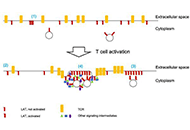 Localization in vesicles, clusters and supramolecular complexes as key elements of LAT functionOpen AccessPerspectiveLinker for activation of T cells (LAT) is a central adaptor protein in proximal T cell activation. A key element of its adaptor function is the efficiency with which LAT interacts with its binding p [...] Read more.Laura E. McMillan, Christoph WülfingPublished: April 27, 2023 Explor Immunol. 2023;3:148–157
Localization in vesicles, clusters and supramolecular complexes as key elements of LAT functionOpen AccessPerspectiveLinker for activation of T cells (LAT) is a central adaptor protein in proximal T cell activation. A key element of its adaptor function is the efficiency with which LAT interacts with its binding p [...] Read more.Laura E. McMillan, Christoph WülfingPublished: April 27, 2023 Explor Immunol. 2023;3:148–157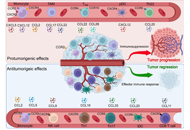 Chemokine-targeted nanoparticles: stimulation of the immune system in cancer immunotherapyOpen AccessReviewSurgery, chemotherapy, radiation therapy, and immunotherapy are potential therapeutic choices for many malignant and metastatic cancers. Despite adverse side effects and pain, surgery and chemothera [...] Read more.Ranjeet Singh ... Partha Pratim MannaPublished: April 27, 2023 Explor Immunol. 2023;3:123–147
Chemokine-targeted nanoparticles: stimulation of the immune system in cancer immunotherapyOpen AccessReviewSurgery, chemotherapy, radiation therapy, and immunotherapy are potential therapeutic choices for many malignant and metastatic cancers. Despite adverse side effects and pain, surgery and chemothera [...] Read more.Ranjeet Singh ... Partha Pratim MannaPublished: April 27, 2023 Explor Immunol. 2023;3:123–147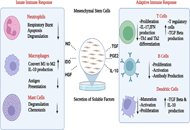 Mesenchymal stem cells—the master immunomodulatorsOpen AccessReviewMesenchymal stem/stromal cells (MSCs) are known as multipotent cells due to their ability to differentiate into various cell lineages of mesoderm origin. Recent developments in stem cell biology hav [...] Read more.Mehak Vohra, Sunil K. AroraPublished: April 27, 2023 Explor Immunol. 2023;3:104–122
Mesenchymal stem cells—the master immunomodulatorsOpen AccessReviewMesenchymal stem/stromal cells (MSCs) are known as multipotent cells due to their ability to differentiate into various cell lineages of mesoderm origin. Recent developments in stem cell biology hav [...] Read more.Mehak Vohra, Sunil K. AroraPublished: April 27, 2023 Explor Immunol. 2023;3:104–122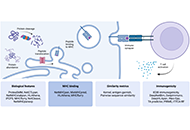 Beyond MHC binding: immunogenicity prediction tools to refine neoantigen selection in cancer patientsOpen AccessReviewIn the last years, multiple efforts have been made to accurately predict neoantigens derived from somatic mutations in cancer patients, either to develop personalized therapeutic vaccines or to stud [...] Read more.Ibel Carri ... María Marcela BarrioPublished: April 25, 2023 Explor Immunol. 2023;3:82–103
Beyond MHC binding: immunogenicity prediction tools to refine neoantigen selection in cancer patientsOpen AccessReviewIn the last years, multiple efforts have been made to accurately predict neoantigens derived from somatic mutations in cancer patients, either to develop personalized therapeutic vaccines or to stud [...] Read more.Ibel Carri ... María Marcela BarrioPublished: April 25, 2023 Explor Immunol. 2023;3:82–103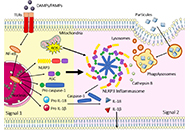 Inflammasomes driven inflammation in lung cancer revisited: a short reviewOpen AccessReviewLung cancer is the leading cause of cancer-related deaths worldwide. The main risk factor for lung cancer is exposure to chemicals present in cigarettes and atmospheric pollutants, which, among othe [...] Read more.Vitor Rodrigues da Costa ... Rodrigo Pinheiro AraldiPublished: March 14, 2023 Explor Immunol. 2023;3:70–81
Inflammasomes driven inflammation in lung cancer revisited: a short reviewOpen AccessReviewLung cancer is the leading cause of cancer-related deaths worldwide. The main risk factor for lung cancer is exposure to chemicals present in cigarettes and atmospheric pollutants, which, among othe [...] Read more.Vitor Rodrigues da Costa ... Rodrigo Pinheiro AraldiPublished: March 14, 2023 Explor Immunol. 2023;3:70–81